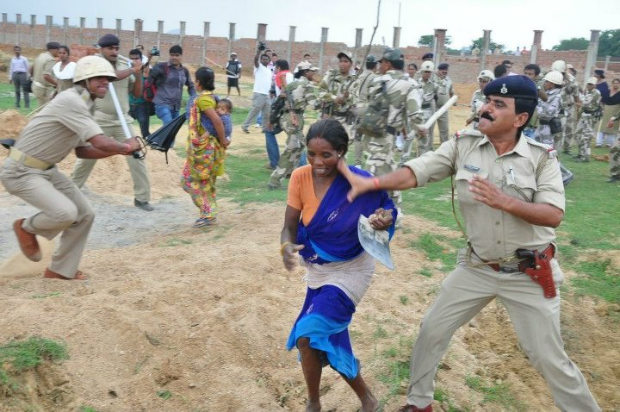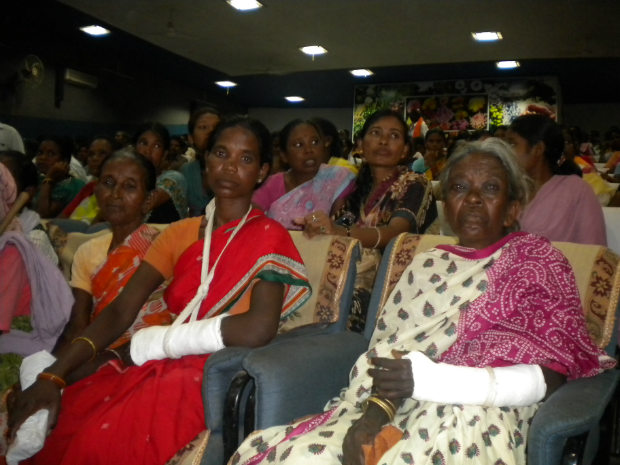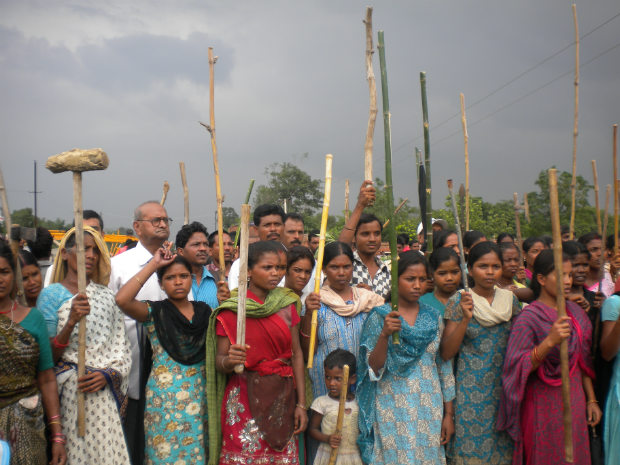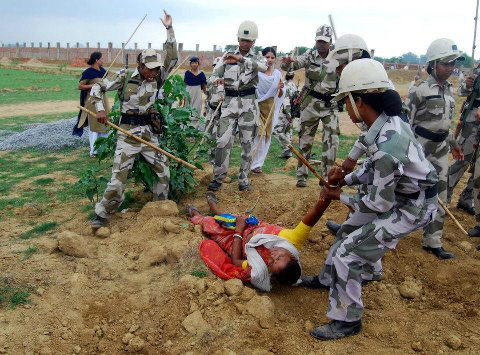
The following article is an abridged version of a much deeper analysis of the Nagri Peoples Movement and their ongoing struggle with India’s judicial system. You can find the original article at the Jharkhand Mirror.
 On 15 July, 2012, in the afternoon, the weather was cool, the sky was cloudy and it was drizzling. The hundreds of Adivasis of Nagri village entered into the central hall of the Birsa Agriculture University, Ranchi, with the single goal of getting back their agriculture lands, which have been captured by the State at the point of a gun. In fact, the Birsa Agriculture University was built on their land after it was snatched from their ancestors. They have been resisting against forceful and illegal land acquisitions because the current government has been attempting to grab the rest of their land in the name of growth and development. They are well aware that if they surrender their land in front of the gun, they’ll become landless, homeless and helpless. Their survival, identity and existence will be vanished. Therefore, they were there to attend a meeting called on by the “High Power Committee” constituted by the Chief Minister of Jharkhand, Arjun Munda on the basis of an order of the Jharkhand High Court, which states that the Government should resolve the land row of Nagri within a week; otherwise, the court will directly deal with the land owners. When the meeting began, the villagers told the High Power Committee that they will not surrender their land at any cost even if they have to face bullets. The Social and Rights Activists also echoed their voices in support of the villagers.
On 15 July, 2012, in the afternoon, the weather was cool, the sky was cloudy and it was drizzling. The hundreds of Adivasis of Nagri village entered into the central hall of the Birsa Agriculture University, Ranchi, with the single goal of getting back their agriculture lands, which have been captured by the State at the point of a gun. In fact, the Birsa Agriculture University was built on their land after it was snatched from their ancestors. They have been resisting against forceful and illegal land acquisitions because the current government has been attempting to grab the rest of their land in the name of growth and development. They are well aware that if they surrender their land in front of the gun, they’ll become landless, homeless and helpless. Their survival, identity and existence will be vanished. Therefore, they were there to attend a meeting called on by the “High Power Committee” constituted by the Chief Minister of Jharkhand, Arjun Munda on the basis of an order of the Jharkhand High Court, which states that the Government should resolve the land row of Nagri within a week; otherwise, the court will directly deal with the land owners. When the meeting began, the villagers told the High Power Committee that they will not surrender their land at any cost even if they have to face bullets. The Social and Rights Activists also echoed their voices in support of the villagers.
After hearing the concerns of villagers, Social and Rights Activists, the Chairperson of the committee and Revenue Minister, Mathura Mahto assured them that the committee will make a decision in favour of the villagers. However, the villagers were not satisfied with the assurance and started raising their voices. They were expecting something solid since their case was dismissed by the Jharkhand High Court.
First of all, let’s understand the land issue of Nagri. An Adivasi-dominated village “Nagri” is situated 15km from Ranchi, the capital city of Jharkhand. On 23 November, 2011, the Jharkhand Government began to capture 227.71 acres of their fertile land, the major part of which was handed over to the IIM (Indian Institutes of Management), the IIIT (Indian Institutes of Information Technology) and the Law University. These institutions started constructing a boundary wall. The government claims that the land was acquired in 1957-58 for the extension of the ‘Birsa Agriculture University and Seed Bank’ under the ‘public purpose’ provided in section 17 (4) of the Land Acquisition Act 1984. Rs. 155,147.88 (about US$2,800.00) was allocated for compensation; however, out of 153 Nagri Raiyats (tenants), 128 had declined the compensation. The Government then deposited the declined money into the treasury without informing the 128 Raiyats.
In 2008, the Jharkhand Government started the acquisition of 12.6 acres of land for the proposed ‘Ring Road’. The Raiyats resisted against this–and when it was taken by force, they approached the Jharkhand High Court for relief. However, the Court did not accept the Raiyats claim and merely ordered the Government to pay compensation with 15 percent interest and closed the case. Interestingly, when the land was supposed to be acquired, it cost Rs. 7 per decimal and today the same land is worth of Rs. 1.5 lakh. The Government is willing to pay merely 1.55 lakh for 227.71 acres of land, which is worth of Rs. 341.5 crore today. The final call of the Raiyats is that they simplt want their land back and don’t want to bid for it at any cost because the land is their only source of survival, identity and existence, and the compensation money will not serve these purposes. They say that once the compensation amount is fished, they’ll be nowhere.
 The Adivasis of Nagri have been knocking on each and every door of democracy; but they are not being heard anywhere. In January 2012, just when the winter crops were to be harvested, the government deployed 3 RAF companies (RAF is a specialized wing of the Indian Central Reserve Police Force). Arriving with bulldozers, The RAF destroyed their potato, pulse, wheat and gram crops, among others. When the villagers strongly protested against this destruction, the Government imposed section 144 of the Indian Penal Code within a 1 km distance of the project area. The villagers were not even allowed to move on their own land. When they resisted against this, an FIR (First Information Report) was filed against 12 villagers including 85 year-old Dhuchu Toppo in allegation of breaching the peace. Ironically, Dhuchu Toppo could not even walk properly but he was a threat to peace in the region. When the construction work of the boundary wall was started, the villagers again went to the Jharkhand High Court and pleaded to stop the construction. The Court rejected their petition on 26 April, 2012. After the Court declined to hear their plea, the villagers sat in indefinite protest on the spot and also gathered support from nearby villagers and outsiders and halted the construction work. They sat in protest for 125 days–a record in the history of the displacement movement.
The Adivasis of Nagri have been knocking on each and every door of democracy; but they are not being heard anywhere. In January 2012, just when the winter crops were to be harvested, the government deployed 3 RAF companies (RAF is a specialized wing of the Indian Central Reserve Police Force). Arriving with bulldozers, The RAF destroyed their potato, pulse, wheat and gram crops, among others. When the villagers strongly protested against this destruction, the Government imposed section 144 of the Indian Penal Code within a 1 km distance of the project area. The villagers were not even allowed to move on their own land. When they resisted against this, an FIR (First Information Report) was filed against 12 villagers including 85 year-old Dhuchu Toppo in allegation of breaching the peace. Ironically, Dhuchu Toppo could not even walk properly but he was a threat to peace in the region. When the construction work of the boundary wall was started, the villagers again went to the Jharkhand High Court and pleaded to stop the construction. The Court rejected their petition on 26 April, 2012. After the Court declined to hear their plea, the villagers sat in indefinite protest on the spot and also gathered support from nearby villagers and outsiders and halted the construction work. They sat in protest for 125 days–a record in the history of the displacement movement.
On 30 April, 2012, while hearing public interest litigation filed by the Bar Association of the Jharkhand High Court, pleading for the completion of construction work of the Law University Campus, the Jharkhand High Court ordered the state government to start construction within 48 hours. Finally, the villagers went to the Supreme Court through a Special Leave Petition (SLP) with a last hope of justice. Not only were they denied that hope, they were humiliated by the Supreme Court. On 28 June, 2012, a legislator, Bandhu Tirkey, and a few villagers, were shocked to see the Judges’ behavior. While the vacation bench was hearing the petition, Justice H.S. Gokhle and Justice Ranjna Prakash Desai threw the file on the ground without even opening it. They said, “Acquisition of the concerned land has taken place in 1957-58, we do not see any reason to interfere with the impugned judgement.” They dismissed the petition.
The Villagers also went to meet the Governor on several occasions to plead for him to intervene in the case. Since Nagri village comes under the Fifth Schedule Area in the state of Jharkhand, as per provisions made in the Indian Constitution, the Governor, who is the constitutional head, has been empowered by the President of India with special powers to issue Public Notification and Regulation to protect and promote the interest of Adivasis in Scheduled Areas and thus maintain ‘Peace & Good Government’. However, the governor refuses to do anything for the Raiyats.
The villagers could see and believe that the Supreme Court, High Court, Governor, State Government and the Police are against them; therefore they’ll not get justice if they don’t fight on the street. They became angry against the ‘state’ and decided to save their land even at the cost of their lives. The behaviour of the Supreme Court fueled their anger.
 On 4 July, 2012, they gathered near the site of the IIM and started breaking the boundary wall. They destroyed the boundary wall of one side of the IIM while the RAF was present. Meanwhile, the Sub-Divisional Officer of Sadar (Ranchi), Shekhar Jamuar, reached the spot and ordered a lathi (cane) charge. The clash started between villagers and the police forces. The Police not only beat the villagers with lathis but also pelted
On 4 July, 2012, they gathered near the site of the IIM and started breaking the boundary wall. They destroyed the boundary wall of one side of the IIM while the RAF was present. Meanwhile, the Sub-Divisional Officer of Sadar (Ranchi), Shekhar Jamuar, reached the spot and ordered a lathi (cane) charge. The clash started between villagers and the police forces. The Police not only beat the villagers with lathis but also pelted  them with stones. Consequently, Dubhan Toppo, Dukhni Toppo, Jammi Toppo and Bandhni Toppo received severe injuries and were admitted to the Rajendra Institute of Medical Science, Ranchi. However, the police filed an FIR against 100 villages alleging they attacked the police and destroyed government property. The police also arrested Jammi Toppo, Bandhni Toppo, Rama Tirkey and Chhoto Toppo. Since Jammi Toppo and Bandhni Toppo were severely injured, they were sent to RIMS for treatment under police custody; but Rama Tirkey and Chhotu Toppo were sent to Jail under the charge of attempted murder of police personnel.
them with stones. Consequently, Dubhan Toppo, Dukhni Toppo, Jammi Toppo and Bandhni Toppo received severe injuries and were admitted to the Rajendra Institute of Medical Science, Ranchi. However, the police filed an FIR against 100 villages alleging they attacked the police and destroyed government property. The police also arrested Jammi Toppo, Bandhni Toppo, Rama Tirkey and Chhoto Toppo. Since Jammi Toppo and Bandhni Toppo were severely injured, they were sent to RIMS for treatment under police custody; but Rama Tirkey and Chhotu Toppo were sent to Jail under the charge of attempted murder of police personnel.
The next day, the villagers sat on the road and declared an indefinite road block on Ranchi-Patratu Highway in demand that all arrested persons be released and the case withdrawn. The People’s organizations, Rights Groups, Political parties, student unions and intellectuals also joined the protest against the terror of the State. There were a series of protests across the state in support of the Nagri People’s Movement. Meanwhile, the villagers also got the support of Sibu Soren, the chairperson of staring committee (Govt of Jharkhand). Two Cabinet Ministers of the Jharkhand Mukti Morch also openly supported the villagers. The Minister of Revenue and Land Reform, Mathura Mahto said that injustice has been done to the Raiyats of Nagri by the government. Hence, the Government was unable to deal the situation.
After seeing the people’s resistance, the Jharkhand High Court also changed its behaviour. On 10 July 2012, the Court ordered the state government to find out the ways with the villagers within a week. On the basis of the order, the Chief Minister constituted a five member ‘High Power Committee’ under the chairmanship of Mathura Mahto, the Minister of Revenue and Land Reform along with four bureaucrats including N.N. Pandey, Secretary (Revenue and Land Reform), Sukhdev Singh, Secretary (Finance Dept), Surendra Singh, Commissioner (South Chhotanagpur) and Vinay Chaubey, Deputy Commissioner (Ranchi). The committee called its first meeting on 14 July but the Raiyats declined to participate in it. They said that if the government wants to talk to them, then the representatives must come to the spot and secondly that the delegation should have an Adivasi majority. Meanwhile, the villagers organized a Jan Panchayat at Nagri on July 15, where more than 10 thousand people participated. They also invited Sibu soren to the Jan Panchayat, where he said that the agriculture land will not be given to the government and the villagers should start ploughing their land. Since Sibu Soren is the head of the coalition government, it had a ripple effect in the state. The support of Sibu Soren fuelled the Nagri movement. Finally, the High Power Committee decided to meet the villagers near their village. The meeting was organized at Birsa Agriculture University, Kanke on July 16.
On 16 July, 2012, the Jharkhand High Court also asked the state government a number of questions while hearing the petition of the Bar Association in the matter of the Law University. The Court asked the State whether it is a government policy that law will prevail or if the issues will be decided in all matters now and in the future? Whether the land in dispute is the only or last cultivable land, acquired after coming into force of the Act of 1894 in the state of Bihar and now in the state of Jharkhand till the year 2012? Whether non acceptance of the compensation by cultivators will nullify the land acquisition proceedings undertaken under the Act of 1894? Whether the state government has taken a decision that all lands which have been acquired after the year 1894 or at least since 1957-58, which was cultivable at that time, shall be declared de-acquisitioned and be returned to the cultivators? Why this will be an inequitable decision for those persons only, whose land have not been violently protested when possession of the land was taken over and whether the Government will be guided by law of violence and will not hear the law abiding persons, who obeyed the law? And if the state government takes a position that no cultivable land should be acquired, then whether that decision will be prospective in nature or retrospective in operation?
The seven-page order seems to be clearly anti-Adivasis and willing to facilitate the land grab of the Adivasis of Nagri village. Needless to say that the people of Jharkhand have been raising their endless voices against the Legislative and the Executive; but in the case of Nagri, the people have also questioned the functioning of the Judiciary, which is of course not a good sign for the democracy. But do people have any other choice? The pertaining questions are why people are questioning the Judiciary. Has the Judiciary become anti-Adivasis? Does the Judiciary favour the bigwigs? One needs to find out the answer. If one would closely observe the behaviour, intention and orders of the Jharkhand High Court, one would definitely say that the Judiciary is not only anti-Adivasis but also anti-poor, anti-Raiyats and anti-Jharkhandis. Dr. Ram Dayal Munda had shared his experiences with the Indian Judiciary in 2007. According to him, the Judiciary has become anti-people, hence, where from can these people get justice? He said, “When we approach to the Judiciary, we are scolded. The Judges say, “We cannot hear the Adivasis. These people don’t talk sense”.”
The Jharkhand High Court seems to be much worried about the future of those students, who have come from outside the state for their studies. The Court has mentioned in its order that there are large number of students still living in hostels who are paying huge amounts of rent resulting in a heavy burden upon the students. At the same time, the Court seems to be insensitive towards the children of Nagri. Why? Why is the High Court not worried about the livelihood, education and future of Adivasi children? There are thousands of children in Nagri village, who have been protesting on the road after deserting their schools to save their land because they are well aware that if land is snatched they will have no future. Do these children also have a right to education as provided in RTE Act 2009? The Indian Constitution guaranteed equal rights to everyone. But why is the Judiciary biased against the Adivasis? Are these children not citizens of India? Indeed, it’s very clear that the Judiciary is completely against the Adivasis.
Ironically, the Law University states in its vision paper that it will develop the ‘Center of excellence for Advocacy of Human Rights with special focus on Tribal Rights’. The moral question is how can the Law University advocate for the rights of Adivasis (tribals) after snatching their livelihood resources for building its centers of excellence? Will it not be rubbing salt on Adivasi wounds? People like Justice Prakash Tatia must read a famous story of Munshi Premchan i.e. ‘Panch Parmeshwar’ before hearing these kinds of cases so that they would be able to deliver justice to the people and also protect the Indian Judicial system. The Justice V R Krishna Iyer once said in the Supreme Court that the ”Judges cannot render justice to the poor because they don’t understand their socio-economic problems. They are from a different world”. The case of Nagri has proved justice V R Krishna Iyer absolutely right.
On 14 July, 2012, the students–mostly outsiders studying in Law University–asked us that why are we opposing the construction of the Law University at Nagri. If they don’t get the University Campus their future will be at stake. They said that the people elect the government and the acquisition has been done by the same Government; so, how it can be illegal and forceful? After patiently hearing their queries, I responded that we are not opposing the Law University but the illegal and forceful acquisition, and we have also given the Government several options. They were not convinced with my answers. However, when I asked them how many acres of land they have, they responded that each one of them possess some patches of land and houses as well. I immediately asked them to surrender their land to me so that I’ll talk to the government and the Law University about coming to their door. They were mum and went back to their hostel. This is one of the living examples, which proves that the elite class is always ready to harvest at any cost and don’t bother about the marginalized people. And of course, the Indian Judiciary is dominated by them only. If the Raiyats of Nagri village are unable to protect their land, the Adivasis of Jharkhand will not only lose their faith in the India Judiciary but they will also have no faith in the Indian democracy. However, the billion dollar question is should ‘corn expect justice from a court comprising of chickens’?
Gladson Dungdung is a Human Rights Activist and associated with the Nagri People’s Movement.

Indigenous Peoples are putting their bodies on the line and it's our responsibility to make sure you know why. That takes time, expertise and resources - and we're up against a constant tide of misinformation and distorted coverage. By supporting IC you're empowering the kind of journalism we need, at the moment we need it most.